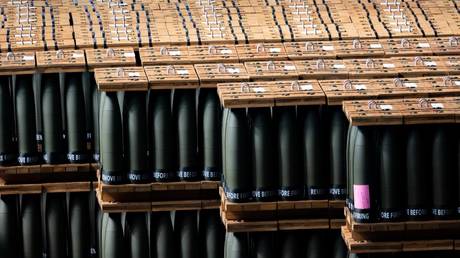
Artillery and anti-tank ammunition make up the bulk of the $325 million weapons haul
The US Department of Defense announced on Tuesday that it will give Ukraine another $325 million worth of arms and ammunition. Compared to earlier packages, the latest shipment seemingly skimps on some of the ammo that Kiev says it needs most.
The package is the 36th tranche of military aid doled out to Ukraine by the US since August 2021. It includes ammunition for Kiev’s US-provided HIMARS rocket artillery systems, as well as 155mm and 105mm artillery rounds, and several types of anti-tank weaponry, including wire-guided TOW missiles, shoulder-fired AT-4 launchers, and anti-tank mines.
Small arms ammunition, assorted aerial munitions, and spare parts make up the rest of the package.
As of January, the US no longer discloses how much of each ammunition type its arms packages include. However, some of these figures can be ascertained by comparing a supplemental fact sheet released by the Pentagon with one that accompanied the last weapons package, announced on March 20.
The total number of 155mm artillery shells sent to Kiev since March 20 remains unchanged at “over 1,500,000,” and the number of 105mm shells also remains static at “over 450,000.” Last month’s package, by contrast, included more than half a million 155mm shells, just under the number that Kiev’s forces need every month to fire their Western-provided guns at full capacity, according to Ukrainian Defense Minister Aleksey Reznikov.
The latest package includes only 500 precision-guided 155mm rounds, 200 TOW missiles, and 1,000 AT-4 missiles. The US has never revealed how many HIMARS projectiles it has given Ukraine, but recent reports indicate that producers at home are struggling to meet Kiev’s demands.
Media reports have warned for months that the effort to arm Ukraine has depleted military inventories in the US and Europe, and Kiev’s consumption of artillery rounds in particular has alarmed American trainers. According to recently leaked Pentagon documents, ammunition shortages may hinder Ukraine’s long-awaited spring offensive against Russian forces.
Russian officials have repeatedly warned that by arming Ukraine, Western nations have made themselves de-facto participants in the conflict. However, Kremlin spokesman Dmitry Peskov said earlier this month that Western weapons shipments to Kiev “cannot influence the final outcome of the special operation.”




